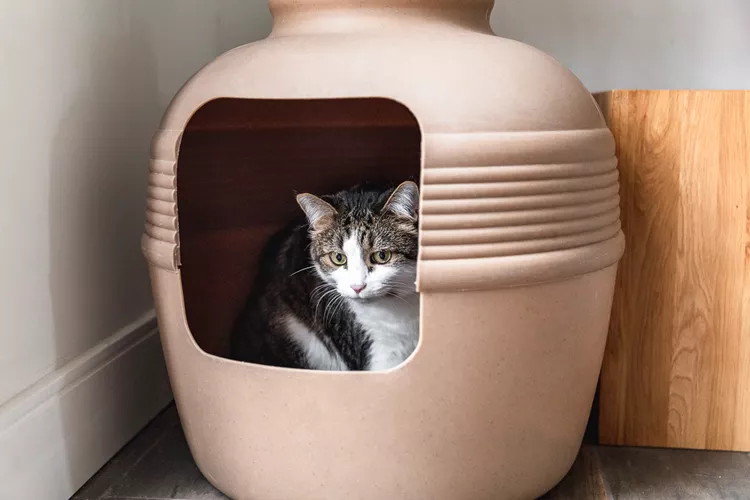Blood in Cat's Stool

If your cat has blood in its stool, there are numerous reasons that could cause it, such as diarrhea, constipation, or growths. As you're cleaning your feline's litter box, it's important to make sure they are having healthy stools and there is no blood present. If so, contact your vet if they are having abnormal stools for a few days or acting ill. Find out more about the underlying causes for blood in your cat's stool, how a diagnosis is made, and how this condition may be treated.
Causes of Blood in Cat Stool
There are a few reasons why you might see blood in cat poop. Some are more serious than others.
Diarrhea
Diarrhea can cause irritation of the lining of the lower gastrointestinal tract, leading to bleeding. If your cat has diarrhea or soft stools, they may start to appear bloody after a couple of days.
Constipation
Constipation often makes a cat strain to defecate. This sometimes leads to ruptured blood vessels in the lower GI tract. The stool often appears hard and small and may have blood on the outside. Both diarrhea and constipation can be caused by stress, dietary changes or intolerance, parasites, foreign bodies, infections, toxin exposure, inflammatory bowel disease, and many other illnesses.
Growths
Growths like polyps, cysts, and tumors can cause blood in the stool.
GI Problems
Many diseases and disorders can cause GI problems that lead to blood in the stool. In some cases, the cat's stool will look normal except for the blood. Watch for dark-colored stools that look tarry or resemble coffee grounds. This may not look like blood at first because it is so dark in color. That's because it is digested or partially digested blood. The presence of dark blood in stools means there is bleeding somewhere in the GI tract, like the small intestine or stomach. Some cats may vomit blood if the bleeding is located in the stomach or esophagus.
UTI
If you see droplets of blood in the litter and on the sides of the box, don't assume it's from the stool. Blood can also be present in the urine, especially if a urinary tract infection is present.
What to Do if Your Cat Has Bloody Stool
You should contact your vet if your cat's bowel movements are abnormal for a few days, even if you don't see blood in the stool. Dealing with the GI problem can prevent blood from appearing in the stool.
If your cat's poop has been normal and you see some blood one time, watch your cat closely for the next day or two. If your cat shows any signs of illness or you see blood again the next day, then it's time to visit your vet.
If your cat has had diarrhea for a day or two, contact your vet to determine the cause of the diarrhea and to help resolve it. This applies whether or not you see blood.
If your cat has not had a bowel movement in a couple of days, you should contact your vet. If you see your cat straining to defecate, this is also a sign of constipation.
When trying to determine the cause of your cat's bloody stool, your vet will do a full examination first. Then, a stool sample may be needed to check for parasites and bacterial overgrowth. In addition, your vet may recommend lab tests to look for problems with the blood cells, organ function, and urinary tract. Abdominal radiographs (X-rays) may also be needed to look for foreign bodies, growths, or structural abnormalities. An ultrasound may also be recommended to get a better look at the abdomen.
Treatment & Prevention
The treatment for bloody stools generally depends on the actual cause of the blood. There are GI support medications and supplements that your vet may recommend if acute illness is not found. This may include the use of probiotics for a period of time. A diet change may also be necessary.
Make sure you follow your vet's advice for routine parasite screening. This is usually recommended about once a year but should be done more often if your cat has abnormal stools. This is especially important if your cat ever goes outdoors.
If constipation is the cause of blood in your cat's stool, your vet can help relieve your cat's discomfort and may be able to determine the cause of constipation. Keeping your cat on a healthy diet high in fiber can help prevent constipation and may relieve the condition as it starts. However, once you notice straining and blood, it has probably been long enough that veterinary care is needed.